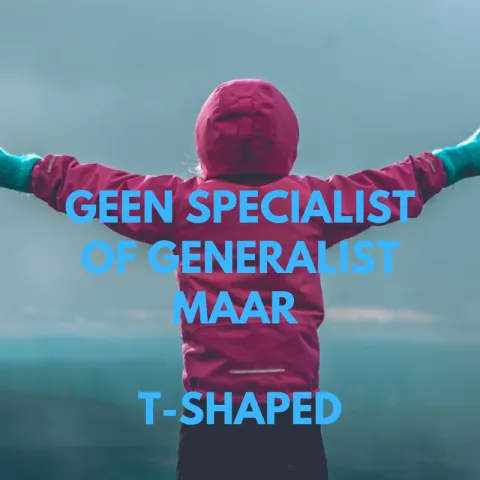
We often envy specialists. People who focus mainly on one subject or activity and do it incredibly well. On the other hand, there are generalists who can do many things well but don’t truly excel in any one of them. I believe that to survive in the future job market, you need to be 'T-shaped'.
To survive in the future job market, you must be able to combine your specialist focus with being a generalist. You need to be 'T-shaped', meaning you possess deep knowledge and skills in a specific area and combine this with the ability to make connections across disciplines. What do I mean by that?
Specialist or generalist?
Edward is a specialist. He is a computer programmer and enjoys developing in Java—something he has done for many years. He never has trouble finding a new job, and they always pay him well. Sometimes he gets frustrated doing the same thing day in and day out. But then he realizes that he’s being asked for that work precisely because he is a specialist and extremely good at what he does. John is a generalist. He works as an operations manager in a small company and is involved in marketing, sales, procurement, and logistics. He does his job well but sometimes feels like a bit of an amateur when talking to a specialized marketer or an experienced buyer. His boss proudly calls him a ‘jack of all trades’. But John also realizes that this makes him a ‘master of none’.
Employability
In the near future, a ‘job for life’ will become increasingly rare. Instead, we are talking more and more about ‘employability’. Employability means having the skills and competencies that allow you to always be able to work.
Learn how to keep learning
Nowadays, having knowledge about many different subjects is very important. We increasingly see diverse people solving complex problems together. In the future, the most important skill you might have is ‘knowing how to keep learning’. The skills needed to be successful are constantly changing, and the amount of available knowledge keeps growing. The best employees always know how to adapt and find the information they need.
T-Shaped
So what exactly is this T-shaped person we keep talking about? And why is it called T-shaped? Well, the 'leg' of the T stands for depth. It represents deep knowledge in a specific subject or area of expertise. You can even have one or multiple 'legs'. The horizontal 'bar' of the T stands for breadth. It represents things like adaptability, the ability to learn new tasks, your emotional quotient, how well you work with people, and your capacity for empathy.
T-shaped Edward
What does this mean for someone like Edward? The 'one trick pony'? I would definitely advise him to remain a specialist Java programmer. But he should also broaden his horizon. He could learn more about other programming languages, (software) architecture, and various programming methodologies. If he learns how to manage projects, he’ll get the opportunity to talk to different specialists in other departments. This way, he’ll learn more about their work. He could even try becoming a trainer and share his expertise with others. Ultimately, he will likely enjoy his work more and have a stronger position in the current—and future—job market.
T-shaped John
And for someone like John? The ‘jack of all trades, master of none’? He too should keep doing what he does best: being a generalist. But he could also dive deeper into a more specialized part of his work. For example, he could take courses in procurement or marketing and earn a certificate or diploma. He will probably enjoy knowing more about a particular specialist topic—especially since he can finally ‘spar’ on an equal level with other experts. He too will have a much stronger position in the job market. Raymond te Veldhuis DataJobs.nl

